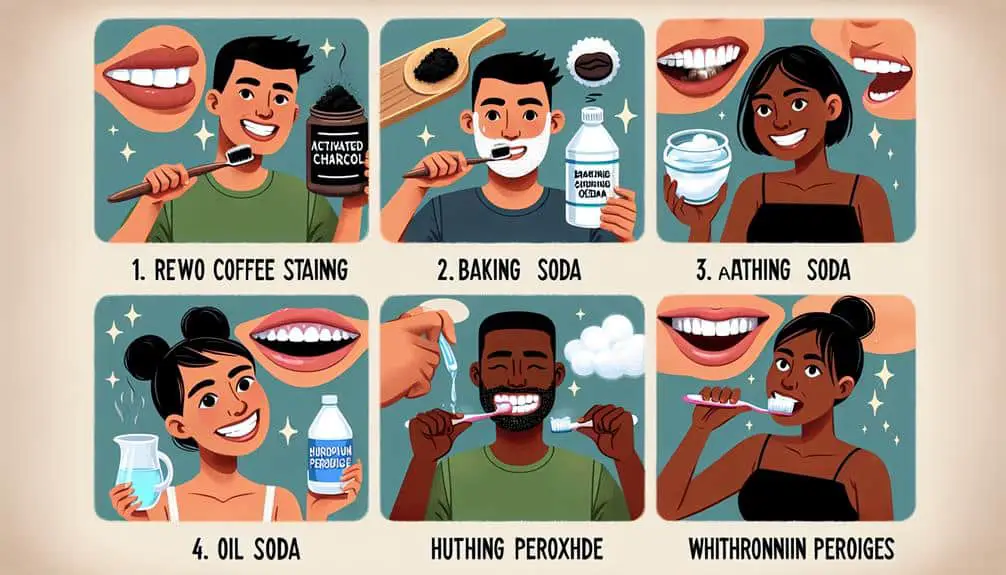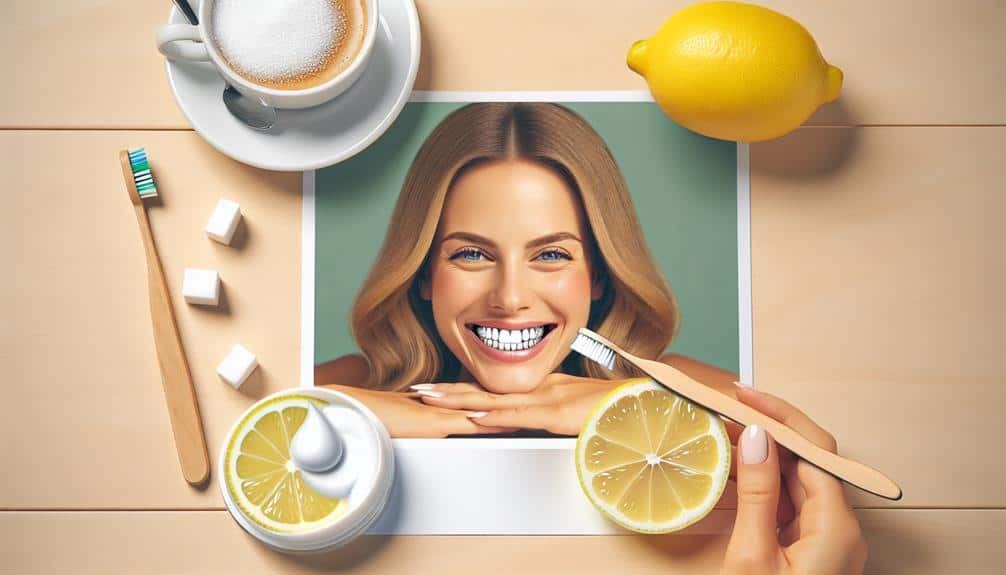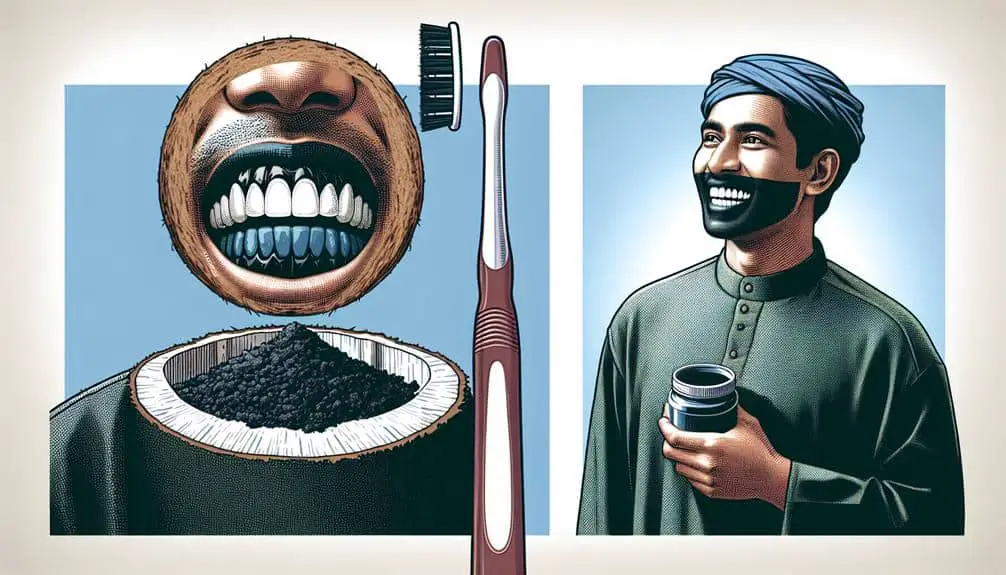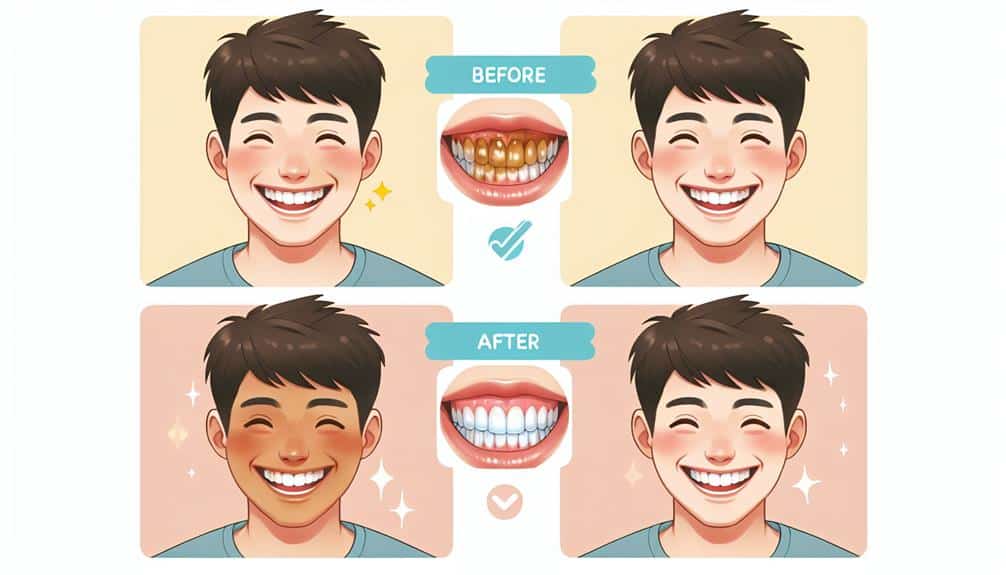Efficiently remove coffee stains from your teeth with these top 5 methods: Start with oil pulling using coconut or sesame oil to swish in your mouth. Create a paste with baking soda and water to brush gently in circular motions. Try a hydrogen peroxide rinse for whitening properties. Use an activated charcoal scrub for a natural lift of surface stains. Consider professional teeth whitening for lasting results with sensitivity management. Keep your smile radiant with these methods.
Key Points
- Oil pulling with coconut or sesame oil for natural toxin removal and improved oral hygiene.
- Baking soda paste gently scrubs away surface stains with mild abrasives.
- Hydrogen peroxide rinse whitens teeth, disinfects, and protects enamel when diluted properly.
- Activated charcoal scrub lifts stains with carbon compounds, enhancing oral hygiene routine.
- Consider professional teeth whitening for efficient, lasting results with sensitivity management.
Oil Pulling
To effectively utilize oil pulling as a method to remove coffee stains from your teeth, begin by selecting a high-quality oil such as coconut or sesame oil. Oil pulling is an ancient Ayurvedic practice that involves swishing oil around in your mouth to improve oral hygiene and remove toxins. When it comes to coffee stains on your teeth, oil pulling can be a natural remedy that helps break down the stains without harsh chemicals.
To incorporate oil pulling into your oral hygiene routine for coffee stain removal, start by taking a tablespoon of coconut or sesame oil and swish it around in your mouth for about 15-20 minutes. Make sure not to swallow the oil as it collects the bacteria and toxins from your mouth. After swishing, spit out the oil into a trash can and rinse your mouth with water. Repeat this process a few times a week to see results in reducing coffee stains on your teeth. Oil pulling is a gentle and natural method that can complement your oral hygiene practices effectively.
Baking Soda Paste
If you're looking for another effective method to combat coffee stains on your teeth, consider using a baking soda paste. Baking soda, or sodium bicarbonate, is a mild abrasive that can help scrub away surface stains on your teeth.
To create a baking soda paste, mix a small amount of baking soda with water until it forms a thick, but spreadable consistency. Once you have your paste ready, apply it to your toothbrush using the toothbrush technique – gently brush your teeth in a circular motion for about two minutes.
After brushing with the baking soda paste, rinse your mouth thoroughly. For an added cleansing effect, you can follow up with a lemon juice rinse. Lemon juice is acidic and can help further break down stains. However, be cautious with this step as excessive use of lemon juice can erode tooth enamel over time.
Remember to use these methods sparingly – about once a week – to avoid damaging your teeth. Baking soda paste, when used correctly, can be a valuable addition to your oral hygiene routine in the battle against coffee stains.
Hydrogen Peroxide Rinse
Consider incorporating a hydrogen peroxide rinse into your oral care routine to help combat coffee stains on your teeth. Hydrogen peroxide is a common household product known for its whitening properties and disinfectant abilities. When used as a mouth rinse, hydrogen peroxide can help remove surface stains on your teeth caused by coffee consumption. It's essential to dilute the hydrogen peroxide properly to avoid any damage to your gums or enamel. Dental research has shown that hydrogen peroxide can be effective in improving oral hygiene and reducing staining when used correctly.
One key benefit of using a hydrogen peroxide rinse is its enamel protection. Unlike some harsh teeth whitening products, hydrogen peroxide can help whiten your teeth without compromising the integrity of your enamel. Additionally, this natural remedy can be a cost-effective solution for maintaining a bright smile. Incorporating a hydrogen peroxide rinse into your oral hygiene routine, alongside regular brushing and flossing, can contribute to keeping your teeth free from coffee stains.
Activated Charcoal Scrub
Activated Charcoal Scrub offers a natural and effective method for removing stubborn coffee stains from your teeth. This DIY solution has gained popularity due to its ability to gently lift surface stains, leaving your teeth looking brighter. Activated charcoal is a form of carbon that has been processed to increase its absorbency. When used as a scrub, it can bind to the compounds that cause discoloration on your teeth, helping to remove them effectively.
To create an Activated Charcoal Scrub at home, mix a small amount of activated charcoal powder with water to form a paste. Apply this paste to your teeth, making sure to cover the stained areas. Gently scrub the paste onto your teeth for 2-3 minutes, then rinse thoroughly.
Importantly, while activated charcoal can be effective at removing surface stains, it may not address deeper discoloration. Regular use of natural remedies like Activated Charcoal Scrub can complement your oral hygiene routine and help maintain a brighter smile.
Professional Teeth Whitening
Professional teeth whitening treatments are commonly sought after for their efficient and lasting results in brightening your smile. One common concern associated with professional teeth whitening is teeth sensitivity. This sensitivity may occur during or after the treatment and usually subsides within a few days. Your dentist may recommend desensitizing toothpaste or other strategies to manage this temporary side effect.
When considering professional teeth whitening, it's vital to compare the costs involved. The price of professional whitening can vary based on the method used, the dentist's expertise, and the location of the practice. In-office whitening procedures are typically more expensive than at-home kits, but they also tend to deliver quicker and more noticeable results. It's important to weigh the cost against the benefits of professional whitening to determine the most suitable option for your budget and desired outcome.
Before opting for a professional whitening treatment, consult with your dentist to discuss the procedure, potential risks, expected results, and aftercare to secure a successful and satisfying whitening experience.
Frequently Asked Questions
Are There Any Long-Term Effects of Using Activated Charcoal Scrub to Remove Coffee Stains From Teeth?
Using activated charcoal scrub to remove coffee stains may seem effective, but long-term use can be abrasive and harm enamel. Consider charcoal alternatives like professional whitening treatments for safer, long-lasting results without potential dental damage.
Can Oil Pulling Effectively Remove Coffee Stains From Teeth if Done Regularly?
If done regularly, coconut oil pulling can effectively remove coffee stains from teeth. Despite initial skepticism, the benefits are notable. Incorporating a green tea rinse can enhance the process, providing a natural and gentle way to maintain a brighter smile.
Is It Safe to Use Hydrogen Peroxide Rinse as a Method to Remove Coffee Stains From Teeth on a Daily Basis?
Using hydrogen peroxide rinse daily to remove coffee stains from teeth may not be safe due to potential enamel damage. While effective in whitening, frequent use can lead to sensitivity and harm.
How Often Should One Use a Baking Soda Paste to See Noticeable Results in Removing Coffee Stains From Teeth?
For noticeable results in removing coffee stains from teeth, use a baking soda paste every 2 weeks. This frequency balances effectiveness without excessive abrasiveness. Regular dental visits guarantee proper maintenance and allow for adjustments based on your individual needs.
Are There Any Potential Risks or Side Effects Associated With Professional Teeth Whitening Treatments for Coffee Stain Removal?
When considering professional teeth whitening treatments for coffee stain removal, potential risks such as tooth sensitivity and gum irritation may occur. It's important to consult with your dentist to understand and address any side effects that could arise.



